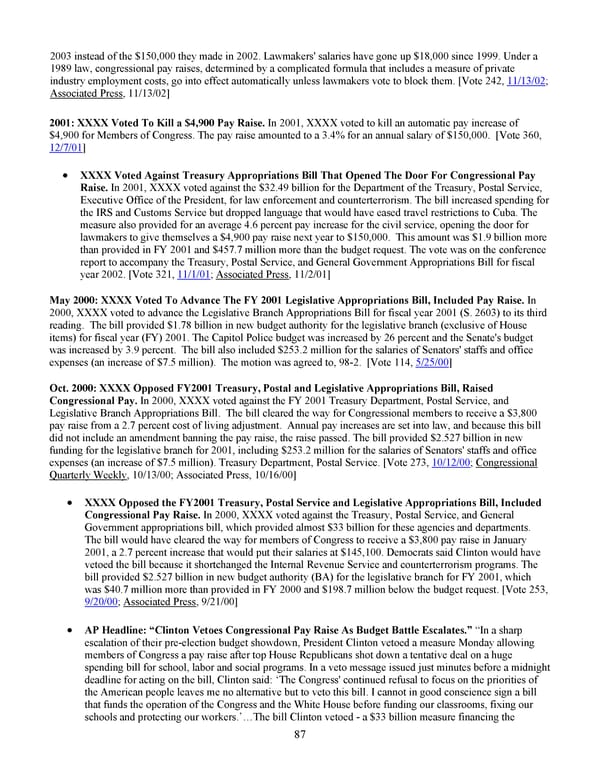2003 instead of the $150,000 they made in 2002. Lawmakers' salaries have gone up $18,000 since 1999. Under a 1989 law, congressional pay raises, determined by a complicated formula that includes a measure of private industry employment costs, go into effect automatically unless lawmakers vote to block them. [Vote 242, 11/13/02; Associated Press, 11/13/02] 2001: XXXX Voted To Kill a $4,900 Pay Raise. In 2001, XXXX voted to kill an automatic pay increase of $4,900 for Members of Congress. The pay raise amounted to a 3.4% for an annual salary of $150,000. [Vote 360, 12/7/01] XXXX Voted Against Treasury Appropriations Bill That Opened The Door For Congressional Pay Raise. In 2001, XXXX voted against the $32.49 billion for the Department of the Treasury, Postal Service, Executive Office of the President, for law enforcement and counterterrorism. The bill increased spending for the IRS and Customs Service but dropped language that would have eased travel restrictions to Cuba. The measure also provided for an average 4.6 percent pay increase for the civil service, opening the door for lawmakers to give themselves a $4,900 pay raise next year to $150,000. This amount was $1.9 billion more than provided in FY 2001 and $457.7 million more than the budget request. The vote was on the conference report to accompany the Treasury, Postal Service, and General Government Appropriations Bill for fiscal year 2002. [Vote 321, 11/1/01; Associated Press, 11/2/01] May 2000: XXXX Voted To Advance The FY 2001 Legislative Appropriations Bill, Included Pay Raise. In 2000, XXXX voted to advance the Legislative Branch Appropriations Bill for fiscal year 2001 (S. 2603) to its third reading. The bill provided $1.78 billion in new budget authority for the legislative branch (exclusive of House items) for fiscal year (FY) 2001. The Capitol Police budget was increased by 26 percent and the Senate's budget was increased by 3.9 percent. The bill also included $253.2 million for the salaries of Senators' staffs and office expenses (an increase of $7.5 million). The motion was agreed to, 98-2. [Vote 114, 5/25/00] Oct. 2000: XXXX Opposed FY2001 Treasury, Postal and Legislative Appropriations Bill, Raised Congressional Pay. In 2000, XXXX voted against the FY 2001 Treasury Department, Postal Service, and Legislative Branch Appropriations Bill. The bill cleared the way for Congressional members to receive a $3,800 pay raise from a 2.7 percent cost of living adjustment. Annual pay increases are set into law, and because this bill did not include an amendment banning the pay raise, the raise passed. The bill provided $2.527 billion in new funding for the legislative branch for 2001, including $253.2 million for the salaries of Senators' staffs and office expenses (an increase of $7.5 million). Treasury Department, Postal Service. [Vote 273, 10/12/00; Congressional Quarterly Weekly, 10/13/00; Associated Press, 10/16/00] XXXX Opposed the FY2001 Treasury, Postal Service and Legislative Appropriations Bill, Included Congressional Pay Raise. In 2000, XXXX voted against the Treasury, Postal Service, and General Government appropriations bill, which provided almost $33 billion for these agencies and departments. The bill would have cleared the way for members of Congress to receive a $3,800 pay raise in January 2001, a 2.7 percent increase that would put their salaries at $145,100. Democrats said Clinton would have vetoed the bill because it shortchanged the Internal Revenue Service and counterterrorism programs. The bill provided $2.527 billion in new budget authority (BA) for the legislative branch for FY 2001, which was $40.7 million more than provided in FY 2000 and $198.7 million below the budget request. [Vote 253, 9/20/00; Associated Press, 9/21/00] AP Headline: “Clinton Vetoes Congressional Pay Raise As Budget Battle Escalates.” “In a sharp escalation of their pre-election budget showdown, President Clinton vetoed a measure Monday allowing members of Congress a pay raise after top House Republicans shot down a tentative deal on a huge spending bill for school, labor and social programs. In a veto message issued just minutes before a midnight deadline for acting on the bill, Clinton said: ‘The Congress' continued refusal to focus on the priorities of the American people leaves me no alternative but to veto this bill. I cannot in good conscience sign a bill that funds the operation of the Congress and the White House before funding our classrooms, fixing our schools and protecting our workers.’…The bill Clinton vetoed - a $33 billion measure financing the 87
 HRC vote skeleton Page 96 Page 98
HRC vote skeleton Page 96 Page 98